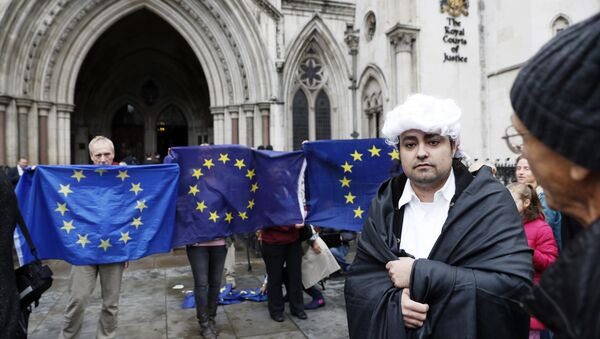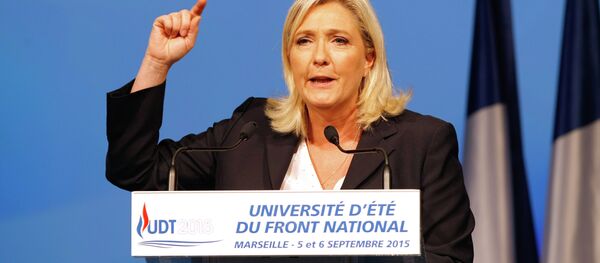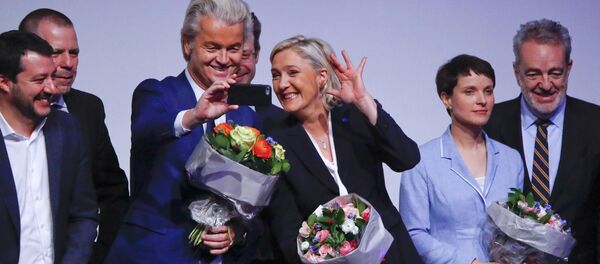Neither Russia, nor China poses a real challenge to the United States, according to John Hamre, president and CEO of the Center for Strategic and International Studies in Washington, DC.
In his interview with Asahi Shimbun, the Japanese daily, the American scholar argues that what should really bother the White House is the European instability.
"My biggest security worry, biggest security worry, is not China, it's not Russia; it's the collapse of Europe. We have always counted on Europe to be our partner on major international issues. If Europe can't become a partner, they're too internally divided or the EU is too weak. This is, in my view, the greatest problem we face," Hamre told the media outlet.
Britain's decision to leave the bloc has made the situation even more complicated, prompting fears about Brexit prompting a domino effect.
Hamre also believes that if the Trump administration manages to lift sanctions against Russia it "would be very destabilizing to the Europeans."
Meanwhile, on Saturday a European Parliament Eurosceptic group of parties, Europe of Nations and Freedom (ENF), held a conference in the German city of Koblenz.
Leaders of the EU's leading right-wing and Eurosceptic parties, including the Alternative for Germany, the Dutch Party for Freedom, France's National Front and Italy's Northern League, called for seeking more independence from Brussels and strengthening ties with Russia.
"The European Union has become a religion. They are priests. One is not allowed to think alternatively. They suppress opposition views, prohibit any criticism of their system. They have become real dogmatists and anti-democrats," the National Front's leader Marine Le Pen told the conference.
At the same time, it appears that Pretzell does not share Hamre's concerns over prospects of US-European collaboration under President Donald Trump.
"We also saw a new US President yesterday, who is likely to change the relationship between Europe and the US. It has to change because Trump has already clearly articulated that he will give Europeans more responsibility for themselves and will interfere less in European affairs," Pretzell undercored.
Indeed, in his pre-inauguration interview with The Times of London and German tabloid Bild Trump stated clearly that he believes that the Europeans "want their own identity"
"People, countries, want their own identity and the UK wanted its own identity," he said, describing the bloc as "basically a vehicle for Germany."
"Personally, I don't think it [a stronger EU versus stronger nation states] matters much for the United States," he added. "I never thought it mattered. Look, the EU was formed, partially, to beat the United States on trade, OK? So, I don't really care whether it's separate or together, to me it doesn't matter."
"I think we, the Europeans, have our fate in our own hands. I will continue pressing for intensive and most importantly forward-looking cooperation between the 27 member states," German Chancellor Angela Merkel told journalists commenting on the US President's remarks.
In his recent interview with Sputnik Polish Adam Wielomski, Chief Editor of Konserwatyzm.pl, pointed out that Merkel is seeking to strengthen unity within the bloc amid the rise of Euroskepticism.
However, it is likely to be no walk in the park given growing dissatisfaction of Europeans with Brussels' policies.
According to November "Parlemeter" poll, commissioned by the European Parliament, the number of people who believe being an EU member is good for their country has fallen to 53 percent. At the same time, almost 54 percent of respondents said they think "things are going in the wrong direction" in the EU.
For its part, the Pew Research Center fact tank reported in June 2016 that "the EU's image and stature have been on a roller coaster ride in recent years throughout Europe."
According to the organization, the bloc's strongest backers are the Poles (72 percent) and the Hungarians (61 percent), while only 27 percent of the Greeks, 38 percent of the French and 47 percent of the Spanish have a favorable opinion of the EU. On the other hand, Britons' decision to leave the bloc speaks louder than words.




